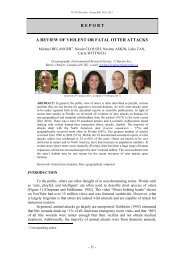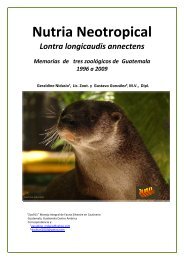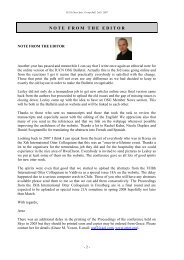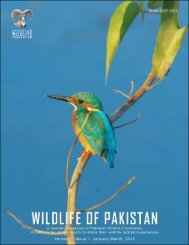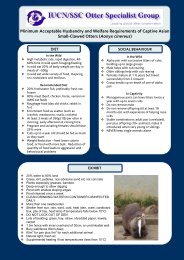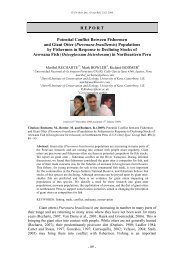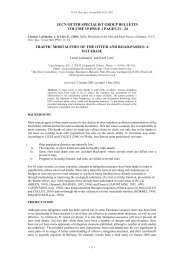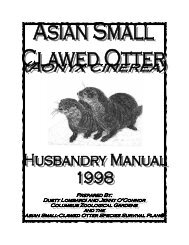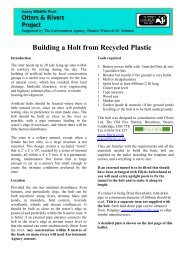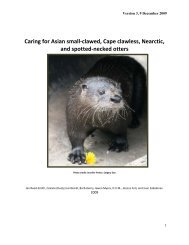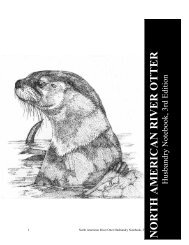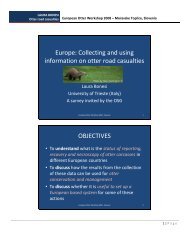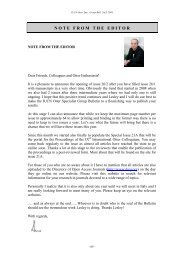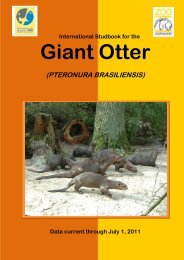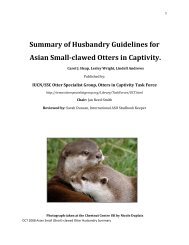International Giant Otter Studbook Husbandry and Management
International Giant Otter Studbook Husbandry and Management
International Giant Otter Studbook Husbandry and Management
Create successful ePaper yourself
Turn your PDF publications into a flip-book with our unique Google optimized e-Paper software.
Section 19<br />
Diet <strong>and</strong> Feeding<br />
Only good quality, mostly fresh water, fish low in thiaminase <strong>and</strong> fat should be offered as<br />
the main diet (Wünnemann 1995). Most salt-water fish contains too much fat that can<br />
cause health problems if it is fed as the main diet. Saltwater fish should only be offered<br />
occasionally (see below). Offering a variety of highest quality fish is advisable to maintain<br />
good health <strong>and</strong> a balanced diet, accommodate eating preferences, avoid fixed<br />
dependencies on a particular fish type <strong>and</strong> add enrichment (Crissey 1998).<br />
The following is excerpted from Wünnemann (1995 b ). “<strong>Giant</strong> otters are the only real 'fisheaters'<br />
among the otters. All studies in the wild say that the main part of their diet is fish....The<br />
broader the spectrum of items, the better. The fish has to be first quality, freshwater fish.<br />
Saltwater fish is taken, but contains too much fat. The amount of food they need is enormous; 3<br />
to 4 kg of food per day per animal, at best given at three to five different times. The ingestion is<br />
very rapid <strong>and</strong> the remains of the food can be found after two or three hours at the defaecation<br />
point.” Also Hagenbeck & Wünnemann (1992) explain, “Marine fish, such as herring (Clupea<br />
harengus) <strong>and</strong> mackerel (Scomber scombrus) are preferred by the otters but are not given as we<br />
consider them too oily to offer a good balanced diet.” “Marine products contain high levels of<br />
poly- <strong>and</strong> mono-unsaturated fatty acids.” (Reed-Smith 2001).<br />
Six out of 16 institutions surveyed fed live fish for enrichment, freshwater rainbow trout (Salmo<br />
gairdneri) or Tilapia. Caution should be taken as feeding live, freshly caught <strong>and</strong>/or poor<br />
quality fish could cause diseases, malnutrition or/<strong>and</strong> transmit parasites. Feeding fish in the<br />
reproductive state (i.e. when they carried eggs) has caused diarrhea <strong>and</strong> loss of appetite, so fish<br />
eggs should be removed before fish is fed (Lazzarini, pers. comm.; Gatz & Sykes-Gatz pers.<br />
comm.)<br />
<strong>Giant</strong> otters should be fed 3-5 times per day (usually 2 - 3 kg [4.4 - 6.6 lbs.] fish/day/adult)<br />
to accommodate fast metabolisms with rapid digestion, prevent accumulation of uneaten<br />
fish left-overs <strong>and</strong> provide enrichment. Amounts eaten can vary with air temperature <strong>and</strong><br />
activity level changes, but if food is refused for one day this could be a sign of sickness.<br />
Excess weight gain or loss <strong>and</strong> daily amounts <strong>and</strong> food types eaten should be monitored <strong>and</strong><br />
recorded.<br />
Fish should be fed in amounts that otters can finish, so that excess uneaten fish is not left<br />
in enclosures during the day <strong>and</strong> overnight. Uneaten fish can attract rats <strong>and</strong> rats could<br />
transmit leptospirosis to the otters. A couple giant otters have contracted leptospirosis <strong>and</strong> this<br />
is suspected to have occurred because large amounts of uneaten fish were left daily in<br />
enclosures overnight/during the day (see Chapter 1 Section 4). When fish remains exist, they<br />
should be removed from all water <strong>and</strong> l<strong>and</strong> areas daily. <strong>Otter</strong>s will eat their fish in the water or<br />
take their fish into the water, as well as eat fish on l<strong>and</strong>. Caution must be taken, as illness may<br />
also occur if otters (esp. cubs) eat spoiled fish remains or are exposed to harmful bacteria ridden<br />
swim water (other than exposure to leptospirosis, neither of these events have been reported to<br />
occur). Note: it is not uncommon that otters will pick up small pieces of left over fish<br />
within their pools <strong>and</strong> l<strong>and</strong> area <strong>and</strong> eat them; this although has not been reported to<br />
cause problems. It is nearly impossible, even with filtration systems, to remove all small<br />
fish pieces from the water. If a significant amount of left-over uneaten fish, that has been<br />
sitting in the enclosure for a while, is regularly consumed, vitamin deficiencies may occur.<br />
193



